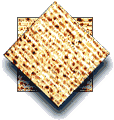 |
 |
 |
PESACH - PASSOVER
(Courtesy
of Rabbi Zalman Morozov - Montreal)
![]()
The holiday of Pesach (Passover) is known
by a variety of names. It is called: 1. "Chag HaMatzot" - "Holiday
of Matzot"; 2. "Chag Ha-Pesach" - "Holiday of Pesach";
3. "Chag Ha-Aviv" - "Holiday of Spring; 3. "Z'man Cheiruteinu"
- "Season of our Freedom".
1. "Chag HaMatzot" - Holiday of Matzot. In the Torah the holiday is called Chag HaMatzot since we are commanded to eat matzah at the Seder and also during the rest of the holiday we are prohibited to eat bread ("Chametz") only matzah.
2. "Chag Ha-Pesach" - Holiday of Pesach. We call the holiday "Pesach" which means "pass-over." It recalls the time when G-d passed over the Jewish homes while afflicting the first-born of the Egyptians. During the era of the Holy Temples, a special Passover sacrifice was offered Erev Pesach and later eaten roasted at the Seder together with the matzah and maror. The sacrifice was called "Korban Pesach."
3. "Chag Ha-Aviv" - Holiday of Spring. Pesach is always celebrated in the spring. For this reason, our sages fixed seven leap years in every nineteen year cycle. This adjusts the Hebrew-Lunar year (354 days) to coincide with the solar year (365 days) so that Pesach will always occur in the spring.
4. "Z'man Cheiruteinu" - Season of our Freedom. Pesach is the holiday of the exodus from Egypt in which we attained our freedom.
Q. What is the reason that the Torah calls the holiday "Chag Ha-Matzot," yet we call it "Pesach?"
A. Rabbi Levi Yitschak of Barditchev explains it based on the verse in Shir HaShirim (Song of Songs 6:3) where King Solomon says, "I am to my beloved and my beloved is to me." This refers to the expression of love between Israel and G-d, who love and praise each other.
"Jews call the holiday Pesach (pass-over)," says Rabbi Levi Yitzchak, "in order to praise G-d and express our love to Him for sparing his people by passing over their homes, when afflicting the first-born Egyptians in Egypt. G-d calls the holiday Chag Ha-Matzot in order to praise the people of Israel for their trust in Him, which is expressed through the Matzot. For the Torah tells us that upon leaving Egypt, the people of Israel didn't prepare food for the way, but immediately took their dough on their shoulders and followed Moshe into the desert with complete faith that G-d would continue to provide for all their needs." In fact, the Zohar calls matzah "food of faith."
"Pesach" can be made into two words; Peh (mouth) Sach (to speak). This reminds us that although the mitzvah of remembering the Exodus applies "each day of your life" (Deut. 16:3), yet on Pesach, it is not enough to only remember, but we must tell the story of the exodus and "speak" about it at length.
We also call the holiday "Pesach" to express our great wish for the ultimate redemption and the rebuilding of the Holy Temple, when we will again be able to perform the mitzvah of eating the Korban Pesach - Pesach lamb.